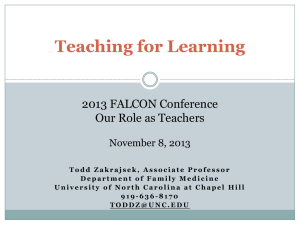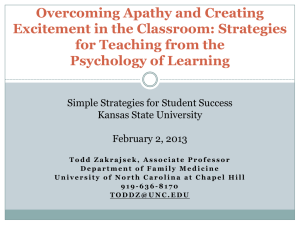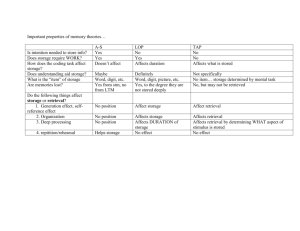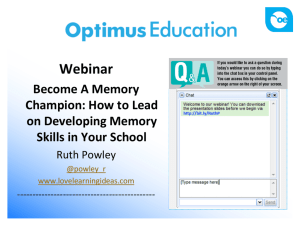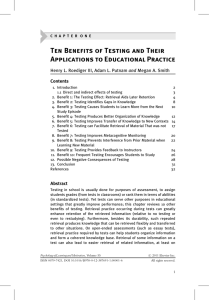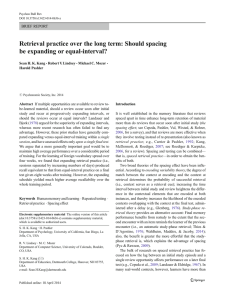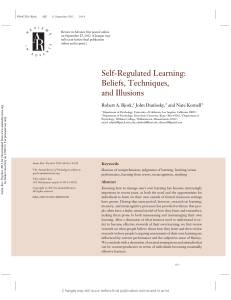How Students Learn: Strategies for Teaching from the Psychology of Learning
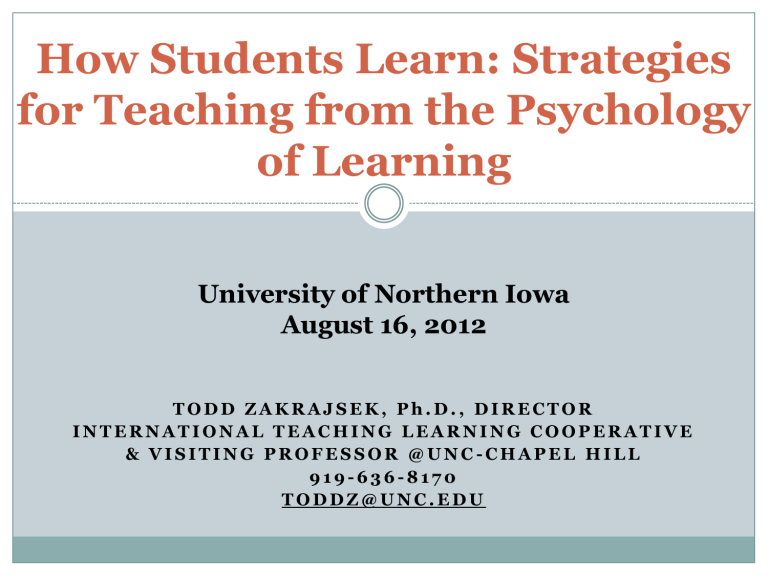
How Students Learn: Strategies for Teaching from the Psychology of Learning
University of Northern Iowa
August 16, 2012
T O D D Z A K R A J S E K , P h . D . , D I R E C T O R
I N T E R N A T I O N A L T E A C H I N G L E A R N I N G C O O P E R A T I V E
& V I S I T I N G P R O F E S S O R @ U N C - C H A P E L H I L L
9 1 9 - 6 3 6 - 8 1 7 0
T O D D Z @ U N C . E D U
Pashler, McDaniel, Rohrer, & Bjork,
2009
Learning Styles: Concepts and Evidence
Seven Principles for Good Practice in
Undergraduate Education
(Gamson & Chickering, 1991)
Contact
Reciprocity
Active
Feedback
Time on task
High expectations
Diverse talents
Hake (1998)
What behaviors illustrate or are good examples of something an unmotivated student might do?
Attribution
How do we describe the “cause” of behavior???
- Internal (dispositional)
- External (situational)
Learned Helplessness
Place “Smart” and “Effort” in Proper Place
Trial 1 Trial 3
Standard
Carol Dweck, 2006
Entity – fixed, less risk
Incremental – growth, accepting challenge
Card passing
What is one issue or concern you have with respect to your students and creating an effective learning environment?
Stage Theory of Learning
External
Stimulus
Forgotten
Atkinson-Shiffrin model, 1968
Initial Processing Coding
Forgotten
Retrieval
Repetition
Good Readers
Poor Readers
Recht & Leslie (1988)
20
10
High Knowledge
Fill Columns
Low Knowledge
Controlled…
Multitasking
Automatic… http://www.youtube.com/watch?v=vJG698U2Mvo
Flingledobe and Pribin
(Lavoie, 1989)
Last Serny, Flingledobe and Pribin were in the Berdlink treppering gloopy caples and cleaming burly greps.
Suddenly, a ditty strezzle boofed into
Flingledobe’s tresk. Pribin glaped. “Oh
Flingledobe,” he chifed, “that ditty strezzle is tunning in your grep!”
Dee Fink, 2003
Power of Social Norms
Cialdini…
Please help:
1.
Help the environment
2.
Benefit Society
3.
Save money
4.
Others are doing it
Practice at Retrieval
(IFAT)
Teach Metacognition
CATS
SQ4R
Chapter Questions
Flash Cards
Quizzing
Types of CATs
Minute Paper (check understanding at end of class session)
Muddiest Point (check understanding at end of class session)
One-Sentence Summary (check understanding at end of class session)
Directed Paraphrasing (check understanding of a concept)
Lecture Checks (Mazur’s Technique)
Card Passing (very good for sensitive topics)
What have you done to help your students to learn?
Levels of Concern vs. Degree of Learning
Level of Concern
.70
.60
.50
.40
.90
Karpicke & Roediger, 2007
SSSS
SSST
STTT
.80
5 Minutes 1 Week
Retention Interval For Final Test
The Effect of Overlearning on Long-Term
Retention
ROHRER, TAYLOR, PASHLER,WIXTED, & CEPEDA, 2005
Overlearners
Control
.70
.50
.30
.10
1 Week 4 Weeks
Retention Interval For Test
9 Weeks
What the Brain Needs to Learn
Exercise
Sleep
Oxygen
Hydration
Food (glucose)
That sets the stage…..THEN there must be…
What the Brain Needs to Learn
That sets the stage…..THEN there must be…
Belief that something can be learned
Importance of Material
Attention
Encoding
Retrieval cues
Correct Level of Anxiety
Selected References
Bjork, R. A., & Linn, M. C. (2006, March). The Science of Learning and the
Learning of Science: Introducing Desirable Difficulties. American Psychological
Society Observer, 19, 29- 39.
Bransford, J.D., Brown, A.L., & Cocking, R.R. (1999). How people learn:
Brain, mind, experience, and school. Washington, DC: National Academy Press.
Chickering, A., & Ehrmann, S. (1996). Implementing the seven principles:
Technology as lever. AAHE Bulletin, October, 3-6.
Goldstein, N. J., Cialdini, R. B., & Griskevicius, V. (2008). A room with a viewpoint: Using normative appeals to motivate environmental conservation in a hotel setting. Journal of Consumer Research, 35, 472-482.
Halpern, D. F. & Hakel, M.D. (2002). Applying the science of learning to university teaching and beyond. New Directions in Teaching and Learning, 89.
San Francisco, CA: Jossey-Bass.
Karpicke, J.D., & Roediger, H.L. (2007). Repeated retrieval during learning is the key to long-term retention. Journal of Memory and Language, 57, 151-162.
Selected References
Mueller, C.M. & Dweck, C.S. (1998). Intelligence praise can undermine motivation and performance. Journal of Personality and Social Psychology, 75,
33-52.
Pashler, H., McDaniel, M., Rohrer, D., & Bjork, R. (2009). Learning Styles:
Concepts and Evidence. Psychological Science in the Public Interest, 9 (3), 105-
119. Available Online - http://psi.sagepub.com/content/9/3/105.full
Recht, D.R., & Leslie, L. (1988). Effect of prior knowledge on good and poor readers’ memory of text. Journal of Educational Psychology, 80, 16 – 20.
Wilson, T.D., Damiani, M. & Shelton, N. (2002). Improving the academic performance of college students with brief attributional interventions. In Joshua
Aronson, Ed., Improving Academic Achievement: Impact of Psychological
Factors on Education. (pp. 91-108). New York: Academic Press.
